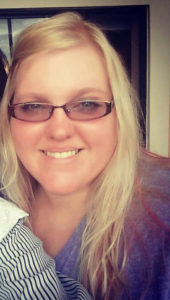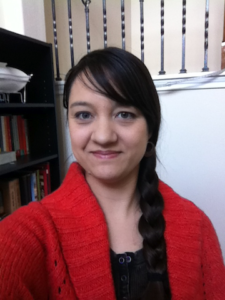All current student members of the IAFA are encouraged to vote for their new representatives!
You have 3 wonderful candidates to choose from! To vote, please rank all candidates from 1-3 and email your selections to Skye Cervone at scervone@fau.edu no later than Monday, May 9th. The candidate with the most votes for first place will serve as the Student Caucus Representative, and the runner-up will serve as Student Caucus Vice-Representative. You will find the bios and pictures of the 3 candidates below.
Amandine Faucheux
Amandine is a second-year PhD student in English and Women’s and Gender Studies at Louisiana State University, where she studies feminist and queer science fiction, with a strong interest in alternative futurisms.
Throughout my graduate career I have helped organize conferences, workshops, and other events in various groups or organizations. I have been a member of the Writing Program Administration Graduate Organization (WPA-GO), a national organization, for over two years, and I serve as one of their grant readers. I am currently the President of the Women’s and Gender Studies Graduate Organization (WGSGO) at my university, which has given me the opportunity to work with a group of students across the disciplines and organize multiples events on and off campus. I also attend regular faculty meetings where I am in charge of representing the interests of the members of this group. Although relatively new to the ICFA community, my extensive experience with student organizations makes me a strong candidate for the job of SCIAFIA Representative.

Sarah Fish
I am currently a PhD Candidate in English and American Literature at the University of Houston. I am ABD, finishing my dissertation about national security and education framed through ideas developed while working with discourses about “zombie students.” I will graduate in May 2017, so I will not be a student for the full term, but I see myself as a good fit as Rep because I have been a member of IAFA and attended ICFA since 2014. Since the 2015 conference, I’ve made a bigger effort to connect with my student and professor colleagues (especially through social media), and I have a broader interest in working with graduate student development. At UH, I have organized TA classroom training and been a part of graduate student professional development panels. IAFA and ICFA have been a major part of my development as a scholar, and I would be happy to serve my fellow student members.

Amanda Rudd
Amanda Rudd is a PhD Candidate in British and American Literature at the University of Houston, specializing in Science Fiction and Globalization. She is working on her dissertation tentatively titled “Globalization and the Evolution of Science Fiction.” She is currently an adjunct lecturer at University of Houston-Downtown, and has taught First-Year Writing courses and Introduction to Science Fiction courses. In the Summer of 2016 she will be teaching two courses (Time Travel Narratives and The Art of Satire) at the prestigious Duke University Talent Identification Program. She has presented at many conferences including the International Conference for the Fantastic in the Arts (2014, 2015, 2016), and the ACA/PCA Conference (2015). She has been published in Brigham Young’s Literature and Belief journal (2012). Her article “Paul’s Empire: Imperialism and Assemblage in Frank Herbert’s Dune” was recently published in the inaugural issue of the Museum of Science Fiction’s publication The Journal of Science Fiction, in January 2016. And her book chapter “‘Shut up and take my money!’: Exposing the Realities of Hyper-Consumerism and Consumption Through Parody in the World of Futurama” is forthcoming in the collection Neoliberalism and Television, currently in negotiation with Lexington Books.
I believe I am a good fit for Student Caucus representative because I have experience both in the field of science fiction and in planning and managing events. As both a PhD student and as a teacher, I have years of experience working in the science fiction field. In addition, I have presented at ICFA for the last three years, which gives me familiarity with the event and the community. Furthermore, I have been highly involved in running a conference: the Coastal Plains Graduate Liberal Arts Conference at the University of Houston, for which I was head of publicity in 2012, Assistant Chair of the Planning Committee in 2013, and finally Chair of the Planning Committee in 2014, during which I made the conference the biggest it has yet been. This position gave me experience in managing and working in collaboration with many people, coordinating with speakers, and fundraising. All of this demonstrates that I am very invested in being involved in and of service to the communities I care about.
